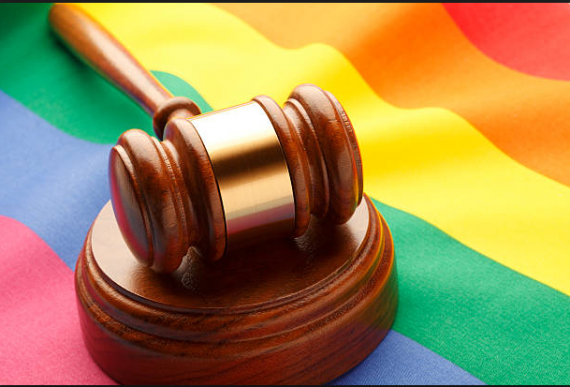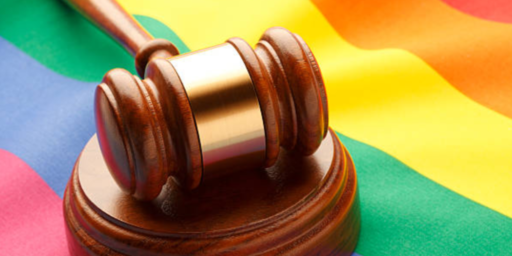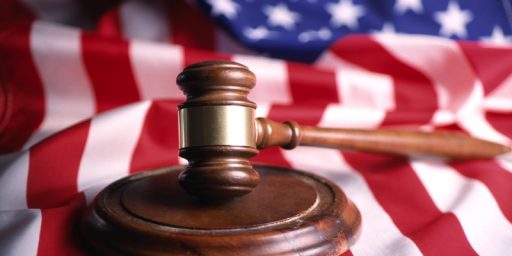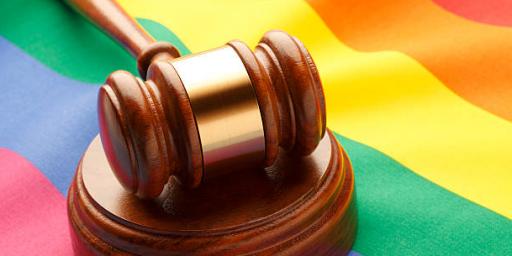Federal Appeals Court Rules That Employers Can’t Discriminate Based On Sexual Orientation
The Second Circuit Court of Appeals rules that existing civil rights laws bar discrimination based on sexual orientation.
In a ruling that seems destined for review by the Supreme Court, the Second Circuit Court of Appeals ruled yesterday that discrimination based on sexual orientation is barred by the same law that bars discrimination based on race, ethnicity, gender, and other factors:
In a case that could have wide-ranging national significance for gay rights, a federal appeals court in New York ruled on Monday that a landmark civil rights law bars employers from discriminating against their workers based on sexual orientation.
The decision was a setback for the Justice Department, which under President Trump had unexpectedly interceded in a discrimination lawsuit filed by a sky-diving instructor. The department had argued that Title VII of the 1964 Civil Rights Act did not explicitly cover sexual-orientation discrimination in the workplace, a stance that put it at odds with another federal body, the Equal Employment Opportunity Commission.
In rejecting the Justice Department’s argument, the United States Court of Appeals for the Second Circuit became the second appeals court to rule recently that the Civil Rights Act, which outlaws bias in the workplace on the basis of “race, color, religion, sex or national origin,” should also be extended to include sexual orientation. A third appellate court in Atlanta has ruled differently.
While gay rights groups hailed the decision on Monday, the ruling could create a scenario in which the issue of gay rights at work will be decided by a Supreme Court that already bears Mr. Trump’s imprint, with his nomination of Justice Neil M. Gorsuch.
Altitude Express, the private party that lost the case on Monday, said it had not decided whether it would ask the Supreme Court to review the decision.
The 10-3 ruling by the Second Circuit stemmed from Altitude Express’s dismissal of a Long Island sky-diving instructor, Donald Zarda, in 2010. As Mr. Zarda was preparing that year for a tandem sky-dive with a female student, he told her that he was “100 percent gay.” Her boyfriend later complained to the school about the comment.
Mr. Zarda said he had made the remark to soothe the woman, who seemed uncomfortable with being so tightly strapped to him during the dive. Mr. Zarda filed a lawsuit, eventually claiming that his firing violated Title VII. Two courts in New York, including a three-judge panel of the Second Circuit, initially ruled against him.
In 2015, Mr. Zarda died in a sky-diving accident. His appeal, however, continued, and the legal landscape started changing. The E.E.O.C., under President Barack Obama, issued a ruling in a separate matter, finding for the first time that “sexual orientation is inherently a ‘sex-based consideration'” and should be protected by the law.
In July, the Trump administration decided to weigh in on the Zarda case. On the same day that Mr. Trump suggested on Twitter that transgender people would be barred from serving in the military, Justice Department lawyers filed a friend of the court brief in Mr. Zarda’s case, arguing that Title VII protections did not extend to sexual orientation.
In its brief, the Justice Department said that the E.E.O.C. was “not speaking for the United States.”
The Justice Department’s intervention in Mr. Zarda’s case led to sharp criticism from groups like the American Civil Liberties Union, which called the brief a “gratuitous and extraordinary attack on L.G.B.T. people’s civil rights.”
The Second Circuit’s ruling on Monday rejected the Justice Department’s position.
In a majority opinion joined at least in part by eight other judges, Chief Judge Robert A. Katzmann wrote, “Since 1964, the legal framework for evaluating Title VII claims has evolved substantially,” adding that it now included expanded protections against discrimination based on factors like “sex stereotypes.” The opinion said that the law should be read to include sexual orientation.
“Sexual orientation discrimination is a subset of sex discrimination because sexual orientation is defined by one’s sex in relation to the sex of those to whom one is attracted,” Judge Katzmann wrote, “making it impossible for an employer to discriminate on the basis of sexual orientation without taking sex into account.”
A 10th judge, José A. Cabranes, agreed with the outcome, but not Judge Katzmann’s reasoning. The appeals court rarely issues decisions through what is known as the en-banc court, in which all eligible judges participate. Typically, it issues decisions through three-judge panels.
Judge Gerard E. Lynch, one of the dissenting judges, said in an opinion that he came to his decision “regretfully,” but that Congress had not included sexual orientation on its list of grounds to outlaw bias in the workplace.
“When interpreting an act of Congress,” Judge Lynch wrote, “we need to respect the choices made by Congress about which social problems to address, and how to address them.” Many states, he noted, had “recognized the injustice of discrimination on the basis of sexual orientation.”
“I hope that one day soon Congress will join them, and adopt that principle on a national basis,” he wrote. “But it has not done so yet.”
The Second Circuit’s ruling on this issue, which overrules an earlier ruling by a three-judge panel of the same court, marks the third time in recent years that a Federal Court of Appeals has ruled on the issue of whether or not existing law applies to discrimination based on sexual orientation and the second time that such a court has found that Title VII’s protection against discrimination based on gender applies to discrimination based on sexual orientation. Just over a year ago, a three-judge panel of the 11th Circuit Court of Appeals ruled that Title VII did not apply to discrimination based on sexual orientation, in no small part due to the fact that there was no evidence that banning such discrimination was within the contemplation of Congress when it passed the law in 1964. Just a month after that though, the Seventh Circuit Court of Appeals ruled in an en banc opinion in which eight of the Court’s eleven Judges joined ruled that discrimination based on sexual orientation was “a form of sex discrimination” and therefore covered by the protections of Title VII. In December, the Supreme Court declined to hear an appeal in the 11th Circuit case. However, with the Second Circuit now coming down on the same side as the Seventh Circuit, the existence of a split in the Circuits is even more apparent. This suggests that the Supreme Court may be inclined to take up the case on appeal if the Defendant in the case chooses to appeal the matter to the nation’s highest court.
As I said in my post regarding the Seventh Circuit’s ruling, the argument in favor of extending the protections of the Civil Rights Act of 1964 to bar discrimination based on sexual orientation strikes me as being a fairly tenuous one that relies on what seems like an overly broad interpretation of applicable law. It’s clear from the legislative history of the Civil Rights Act that the ban on discrimination based on “sex” was intended to cover situations was hired, fired, or treated unfairly based on their gender, not on the question of whether or not they were discriminated against based on whether they were attracted to the opposite gender or their own gender. This was simply not an issue at the time the law was drafted and it’s difficult to imagine that the legislators who voted in favor of it intended that the law they were passing should be interpreted to apply to those types of situations. This has been most explicitly been recognized at the state level, where many states and localities have passed laws that bar discrimination based on sexual orientation by government agencies and by private businesses. At the Federal level, many people have been arguing in favor of a proposed law known as the Employment Non-Discrimination Act, which would expand Federal anti-discrimination law regarding employment to cover discrimination based on sexual orientation That law has been pending before Congress in one form or another for several years now but has not been brought up for a floor vote in either the House or the Senate. Instead of relying on the courts to deliver a very creative interpretation of a law that was passed fifty-four years ago, it seems to me that it would be more appropriate to leave the matter to the legislature where it belongs. As a general rule, it should not be the job of Judges to read things into statutes, or the Constitution for that matter, that clearly isn’t there. In this case, it seems clear that there is no ban on discrimination based on sexual orientation in the Civil Rights Act of 1964 and that it was never the intention of the drafters of that law or the Congressmen and Senators that the law cover such situations. Given that, the law should not be interpreted broadly to create liability under the law that clearly doesn’t exist based on a fair reading of the words on the paper.
None of this is to suggest that discrimination based on sexual orientation isn’t wrong on some moral level, of course. Ideally, any discrimination based on anything other than one’s fitness for a particular job and job performance is unfair on some level. However, that is a different thing from the question of whether a law that was intended to bar one thing should be interpreted to bar something else. For better or worse, it is the job of the Legislative Branch to make law, the job of the Executive Branch to execute those laws, and the job of the Judiciary to interpret those laws in light of the Constitution. One can make the case that in our current political climate, the system isn’t exactly working that way and that it’s unlikely that something like ENDA is going to pass Congress unless Democrats gain control of both the House and the Senate, a filibuster-proof majority in the upper chamber, and a Democratic President, however, that’s immaterial to the situation. Judges should not be stepping in to do what some people think Congress should do just because Congress isn’t going to do it. That’s not how the law works, that’s not how the balance of powers set forth in the Constitution was meant to work, and that’s not how Judges should be doing their jobs.
Here’s the opinion of the Second Circuit, including concurring and dissenting opinions:
Zarda Et Al v. Altitude Express Et Al by Doug Mataconis on Scribd





Can you help me, a nonlawyer, understand how attraction to opposite or same gender is not treating someone unfairly based on their gender?
If Female Person A was fired for being attracted to/being in a relationship with Female Person B, and Male Person A would not be fired for being attracted to/being in a relationship with Female Person B, how is that not discriminating based on gender? The outcome changes depending on the gender of the person, hence its gender discrimination, no?
I understand originalism, and taking a law’s intent into account. But why should legislation be exempt from the law of unintended consequences?
@Neil Hudelson:
Because discrimination based on sexual orientation is quite simply not the same thing as discrimination based on gender. More importantly, it clearly was not within the contemplation of the drafters of the CRA or the people who voted on it in 1964. This is a matter for the legislature, not the Courts.
@Kathy:
This isn’t about “originalism” it’s about statutory interpretation. How on earth is it proper for a Court to interpret a law that Congress or a state legislature passed to cover specific issues to cover things that they clearly did not contemplate at the time the statute was drafted?
A Judge who does that isn’t being a Judge, they are acting like a super-legislature, and that’s not what Article III of the Constitution was meant to accomplish.
@Doug Mataconis: So because men and women are discriminated equally in same sex relationships, there’s no sex/gender discrimination going on?
Lots of legislation has all sorts of unintended consequences, most of them bad. When you run into one that lifts oppression from some, isn’t that good?
I also understand how important it is to follow norms and laws. But a judge has the duty to interpret the law, or as Chief Justice Marshal put it: “It is emphatically the province and duty of the judicial department to say what the law is.”
@Kathy:
Right. But that’s decidedly not the same time as saying what the law ought to be.
@James Joyner: The interpretation is that gender discrimination includes same sex relationship. The reasoning may be wrong or flawed, but it is an interpretation, not a statement of what the law ought to be.
@Kathy: It’s an incredibly novel interpretation of a 53-year-old law that quite surely did not contemplate that outcome. Whose authors would have considered that outcome insane. It’s quite obviously not what the law intended. And I say that as one who supports that outcome of the ruling.
So you believe the Supreme Court’s decision in Obergefell v. Hodges is illegitimate? After all, those who drafted the particular amendments to the Constitution that are the basis for the ruling surely had not contemplated gay marriage…
I wouldn’t assume that state laws demonstrate that federal law is insufficient, merely that it is insufficient as enforced.
Sex, gender, and sexual-orientation are a big connected blob — and science has advanced a lot in the past 53 years to the point where we are seeing how connected they are.
If a gay man is fired for being too effeminate, or for having a picture of his boyfriend on his desk, he is being fired for failing to present his traditional role as a man. He is being fired for his gender.
Doug, you have an amazing capacity to keep being amazed at something that has been repeatedly happening and explained.
These opinions literally mirror the rationale from SCOTUS in the PriceWaterhouse case. Are you equally still amazed and surprised that it is illegal to discriminate against nonconformity to traditional gender roles?
Absent a label, how is it different? Woman wearing a pants suit is discriminated against because that is traditionally male attire. Woman sleeping with another woman is discriminated against because that is a traditionally male role.
I don’t get your amazement or inability to understand.
@James Joyner: nope. See PriceWaterhouse. Or the last three times Doug has expressed this same amazement.